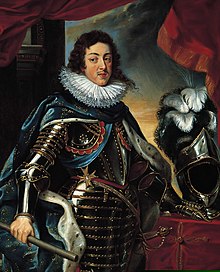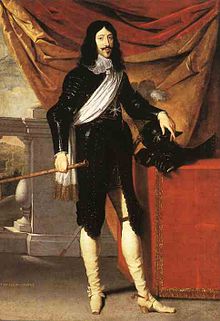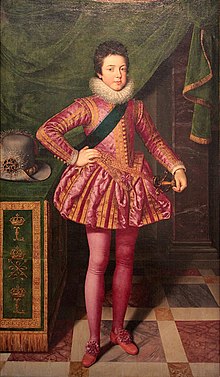Louis XIII.
Louis XIII. (Born September 27, 1601 in Fontainebleau , † May 14, 1643 in Saint-Germain-en-Laye ) was King of France and Navarre from 1610 to 1643 . He was nicknamed Louis le Juste (German: Ludwig the Just).
Life

Louis XIII. was the second French king from the House of Bourbon . He was the eldest son of Henry IV of France and his second wife Maria de 'Medici . After his father was murdered in 1610, he succeeded him to the throne at the age of nine. Actual power was taken over by his mother as regent . In 1617, at the age of 16, Ludwig XIII. Concino Concini , his mother's favorite, eliminated and exiled her. After the reconciliation, he made his mother's advisor, Cardinal Richelieu , minister in 1624 . Despite intense hostility and numerous intrigues, the king supported this capable advisor until his death.
childhood
Ludwig was born on September 27, 1601. In 50 years he was the first Dauphin to be born in France. Ludwig grew up away from court under the care of Madame de Mouglat and personal physician Jean Héroard (1551-1628). The latter kept a detailed diary of the health condition, psyche, inclinations and occupations of the young heir to the throne, leaving behind a unique document about the upbringing of princes from a time that hardly any written sources about children know. The sensitive child suffered from the strict upbringing, which was marked by blows, and the separation from the adored father.
Reign of Maria de 'Medici
Henry IV was murdered on May 14, 1610 by the religious fanatic François Ravaillac - shortly after the coronation of Maria de 'Medici and shortly before he started the war against Habsburg . Louis XIII. was crowned king on October 17, 1610 in Reims Cathedral. The mother took over the reign for the minor. In contrast to her husband and predecessor, she operated a policy that was friendly to Spain under the leadership of two favorites from the Italian entourage, Leonora Dori Galigaï and Concino Concini . The most visible sign was the double wedding of their two oldest children in 1615: Ludwig with the Spanish Princess Anna of Austria and Elisabeth with the Spanish heir to the throne, who later became Philip IV of Spain .
On the occasion of the declaration of majority of Louis and pressure . Henry II of Bourbon, Prince de Condé , the next heir to the French throne, were in 1614 - the last time before 1788/89 which - Estates General convened. The young king was nevertheless kept away from the government and the council as "the most childish child". The Estates General became the first public platform for Jean Armand du Plessis, the ambitious Bishop of Luçon and later Cardinal Richelieu.
Seizure of power and conflict with the Queen Mother
Ludwig XIII was kept at court. for an incompetent idiot. The surprise was all the greater when the barely sixteen-year-old king had Concino Concini murdered on April 24, 1617 and seized power. He sent his mother into exile in Blois . The former falconer of the king, Charles d'Albert de Luynes (1578–1621) took over the title, property and position of the murdered man and soon became just as unpopular.
In exile, Maria de 'Medici became the focal point for all attempts by the high nobility to weaken the royal power. In 1620, Ludwig put down a conspiracy by force of arms in which his mother and the Duke of Épernon were the focus. In the subsequent peace negotiations between mother and son, the Bishop of Luçon made himself indispensable. In 1621, during a long stay of the king in the south of France, she managed to return to court. In the same year, Luynes, who had been appointed commander-in-chief but was fighting haplessly, died during the campaign against the rebellious Huguenots in southern France.
Agreement between mother and son - the rise of Richelieu
Louis XIII. after the failure of his favorite, swore to separate matters of the heart and business of government. Maria de 'Medici gained increasing influence. She returned to the Privy Council and was finally able to overcome the young king's resistance to the appointment of her confidante and advisor, du Plessis (since September 1622 Cardinal von Richelieu), to the Privy Council. However, their hope and the expectations of all observers that this would boost their influence and prospective politics was not fulfilled.
The new minister swung on the national ( Gallican ) course and went on a confrontation with the Habsburgs, the grandees and the Huguenots. He was responsible for the dynastic connection with England, had papal troops expelled from the Valtellina , supported the Protestant opponents of the Habsburgs in the Holy Roman Empire of the German nation and broke the politico-military power of the Huguenots by conquering La Rochelle (1627–1628) . The cardinal was soon faced with an ever larger front of opponents, which over time also included his former patroness Maria de 'Medici.
The day of the disappointed
Maria de 'Medici pressed for the dismissal of the minister after the king was seriously ill on the campaigns against La Rochelle and Savoy. On November 10, 1630 there was an open break between Maria de 'Medici and the cardinal. She urged her desperately mediating son to choose between mother and minister. For one day all of the cardinal's opponents believed themselves to be victorious. Then Louis XIII decided. against his mother ( see: Journée des Dupes ). Your advisors have been arrested; on February 23, 1631 Maria de 'Medici was sent into lifelong exile.
Dynastic triumph and personal tragedy
In the last twelve years of his life, Louis XIII saw how, under the joint rule with Richelieu, the power of France and the power of the royal family in France were continuously strengthened. The deeply religious king paid for his triumph over the emperor and the Spanish king with grave remorse. The gagging of the rebellious nobility was bought with the blood of his relatives, his authority with the execution of his last favorite, Henri Coiffier de Ruzé, Marquis de Cinq-Mars . The late birth of two sons (1638 and 1640) ensured the dynastic survival of the royal family. However, his marriage (1615–1643) remained unhappy and he had doubts as to whether these children were descended from him.
death
Louis XIII. died on May 14, 1643 in Saint-Germain-en-Laye , he was buried in the tomb of the French kings, the cathedral of Saint-Denis . When the royal tombs of Saint-Denis were sacked during the French Revolution , his tomb was opened and looted on October 15, 1793, and his remains were buried in a mass grave outside the church.
Personality and impact
Louis XIII. wanted to go down in history as Ludwig the Just (Louis le Juste) at a young age. He did not understand justice in the modern sense, but in the sense of the patriarchal restoration of law and order. This wish was shaped by decades of civil wars and Ludwig's experience with the indulgent "checkbook diplomacy" of his mother and the destructive particular interests of high nobility, Huguenots and the "ultramontane" supporters of the Pope and the Spanish king. Louis XIII. and his minister made essential steps on France's path to continental supremacy and absolutism .
The image of the person and the ruler Louis XIII. is to this day - despite good sources - more influenced by literary fiction than by historical studies. The image of the feeble, uninterested and naive idiot who was the object of the manipulation of the equally ingenious and scheming Minister Richelieu was shaped in particular by the novel " The Three Musketeers " by Alexandre Dumas and reinforced by numerous film adaptations of this model.
In fact, Louis XIII was. a shy personality who did not feel comfortable in company and tended to stutter. Nevertheless, he had a strong will and the ability to act decisively and ruthlessly (even against his own feelings). He found himself in a constant field of tension between his own claims to his role as an absolute monarch and his private inclinations. The quote comes from him: "I would not be a king if I allowed myself the feelings of a private person."
Last but not least, the monarch's petty jealousy also suffered his minister, who always ruled with the knowledge that he owed his position solely to the goodwill of the king. Ludwig always reserved the decision in all important matters. Richelieu wrote the famous sentence: "All of Europe doesn't give me as much headache as the four square meters of the royal cabinet."
progeny
With his wife Anna of Austria he had two sons:
- Louis XIV (1638–1715) King of France
- ⚭ 1660 Maria Teresa of Spain
- ⚭ 1683 (in a morganatic marriage ) Madame de Maintenon
- Philip of France, Duke of Orléans (1640–1701)
- ⚭ 1661 Henrietta of England
- ⚭ 1671 Liselotte of the Palatinate
ancestors
| Pedigree of Ludwig XIII. | ||||||||
|---|---|---|---|---|---|---|---|---|
| Great-great-grandparents |
François de Bourbon, comte de Vendôme (1470–1495) |
Duke |
King |
Charles de Valois, comte d'Angoulême (1459–1496) |
Giovanni de 'Medici (1498–1526) |
Pedro Álvarez de Toledo (1484–1553) |
King |
King |
| Great grandparents |
Charles de Bourbon, duc de Vendôme (1489–1537) |
King |
Cosimo I de 'Medici (1519–1574) |
Emperor |
||||
| Grandparents |
Antoine de Bourbon, duc de Vendôme (1518–1562) |
Francesco I de 'Medici (1541–1587) |
||||||
| parents |
King Henry IV (France) (1553–1610) |
|||||||
|
Louis XIII. (1601–1643), King of France and Navarre |
||||||||
reception
An episode from 1627 about court intrigues and the siege of La Rochelle served as the template for the famous novel:
- Alexandre Dumas : The Three Musketeers
The popular series of novels Fortune de France by Robert Merle is less literary . At the time of the reign of Louis XIII. play the volumes:
- Robert Merle: The wild dance of silk skirts , Aufbau-Verlag, Berlin 1997, ISBN 3-7466-1216-0
- Robert Merle: Das Königskind , Aufbau-Verlag, Berlin 1998, ISBN 3-7466-1217-9
- Robert Merle: Die Rosen des Lebens , Aufbau-Verlag, Berlin 2000, ISBN 3-351-02383-9
- Robert Merle: Lilie und Purpur , Aufbau-Verlag, Berlin 2001, ISBN 3-351-02885-7
- Robert Merle: A cardinal before La Rochelle , Aufbau-Verlag, Berlin 2001, ISBN 3-7466-1225-X
- Robert Merle: The Queen's Revenge , Aufbau-Verlag, Berlin 2007, ISBN 3-7466-1226-8
literature
- Carl J. Burkhardt: Richelieu, the rise to power. Callwey, Munich 1935.
- Philipp Erlanger: Richelieu. Paris 1967-1970.
- P. C. Hartmann (ed.): French kings and emperors of the modern age. C. H. Beck Verlag, Munich 1994, ISBN 3-406-38506-0 .
- Klaus Malettke : The Bourbons Volume I: From Heinrich IV. To Louis XIV. (1589-1715). Kohlhammer, Stuttgart 2008, ISBN 978-3-17-020581-9 .
Web links
- Publications by and about Ludwig XIII. in the VD 17 .
- Literature about Louis XIII. in the catalog of the German National Library
- Works by and about Ludwig XIII. in the German Digital Library
Remarks
- ↑ Reims Cathedral: Chronology of the French kings crowned in Reims , consulted on October 16, 2011
| predecessor | government office | successor |
|---|---|---|
| Henry IV |
King of France and Navarre 1610–1643 |
Louis XIV |
| Henry IV |
French co-prince of Andorra 1610–1643 |
Louis XIV |
| personal data | |
|---|---|
| SURNAME | Louis XIII. |
| BRIEF DESCRIPTION | King of France |
| BIRTH DATE | September 27, 1601 |
| PLACE OF BIRTH | Fontainebleau |
| DATE OF DEATH | May 14, 1643 |
| PLACE OF DEATH | Saint-Germain-en-Laye |



